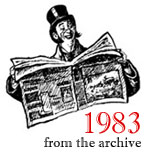
Michael Novak’s Neoliberal Catholicism
LETTER FROM ENGLAND
Michael Novak is a curious fellow. On the basis of no personal acquaintance at all, I see him as the kind of man one cannot help liking, albeit with pursed lips, a frown, a shake of one’s head. He’s certainly a good writer — a poet, I suspect, by real vocation.
His deeply interesting recent book, Confession of a Catholic, falls into two halves. In Part I he offers a sustained meditation on the Creed, article by article, as understood by himself, often subjectively but always rewardingly and sometimes very profoundly, and with constant reference to daily life as experienced today. But in so doing, he keeps drawing our attention to the curious semantic condition in which the word “Catholic” now finds itself. In most common usage — to the distress of some Anglicans — this word is practically synonymous with “Roman Catholic” or (if you like) “Papist.” But even in that latter sense, it is currently applied to two quite different sets of people. The difference lies in their respective attitudes to the teaching Church and its magisterium. There are some who give the “assent of faith” to this: there’s many another who only gives it selective assent.
Novak is “a Catholic” in this latter sense, and is clearly ill at ease with the fact. Mother Church is a voice and tradition with which he finds himself very considerably in agreement: he tries but fails to see her also as a schoolmistress from whom he should be prepared to learn, accepting correction where necessary.
He’s very honest about this. It is most clear in matters of sexual morality, with Humanae Vitae as a prime example of the schoolmistress getting the sum wrong — but also in matters of nuclear morality, though this subject gets little mention here. But in principle, this split-mindedness is present at every point, recognized in his clear distinction between “the faith of Catholics” and “my faith,” and illustrated by certain of his very idiosyncratic interpretations of the Creed. He even rebukes the schoolmistress for giving insufficient respect to what he calls “democratic capitalism,” as though this ideological preference of his ought to become the correct line for all Catholics. It’s the skeptic in me who stands amazed at this assurance.
You May Also Enjoy
ALL's Judie Brown urges bishops to 'respectfully' deny Communion to those whose presence 'defiles the Mass and the Body of Christ.'
Former senator Rick Santorum has abandoned the culture war in order to join forces with the neocons calling for war on Iran.
John Paul II wrote of political superpowers that all-consuming pursuit of profit and power are “forms of modern imperialism” and “real forms of idolatry.”

